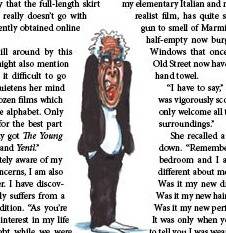Several years ago my husband and I asked a local friend who is an ex-clergyman to inquire whether the church in our Welsh village would allow a secular funeral service within its walls. For years I have maintained, "I don't believe in God but I do believe in St Mary's Crickadarn" - a beautiful 14th-century building with crenellated square tower. The local vicar said he would have to consult the Archdeacon. The answer came back: No. It seemed, however, as residents of the parish (where we have had a second home for more than 30 years), we did have a right to be buried in St Mary's churchyard.
The occasion presented itself in April. My husband, Sir John Maddox, editor emeritus of Nature, died - in Wales as it turned out, in Nevill Hall Hospital, Abergavenny, from pneumonia developed after a fall. My daughter, son and I decided to see if the vicar would relent. We met him in the grounds of Brecon Cathedral on a sunny afternoon when he was superintending a bouncy castle. As we spoke, young clergymen in cassocks jumped up and down on the canvas - giving the Brecon and Radnorshire Express an opportunity for a photograph captioned "Leaps of Faith".
The vicar stuck to the party line: on church premises, church words must be used. For a moment, the three of us considered holding John's service inside St Mary's simply for the beauty of the architecture. But when the vicar recited the obligatory words - "I am the Resurrection and the life . . . he who believeth in me shall not die forever" - we dropped the idea. Utterly inappropriate for a committed atheist.
We compromised on a marquee on a field adjacent to the church. For music, my daughter enlisted the Builth Male Voice Choir, who arrived 30-strong in bright blue blazers and with an accompanist and portable piano. They sang "Myfanwy" - a song that never failed to bring a tear to my husband's Welsh eye.
Our ex-ecclesiastical friend rose to the occasion. He may have lost his faith but not his sonority. "You will notice," he told the assembled throng, which included a surprising number who had come the 180 miles from London, "that we are meeting in a 'tent', not in a church." The point was stressed by the bleating of sheep heard through the canvas.
My son then read from Richard Dawkins (pointing out that the suggestion had come from Dawkins) from his Unweaving the Rainbow: "We are going to die, and that makes us the lucky ones. Most people are never going to die because they are never going to be born . . . the set of possible people allowed by our DNA so massively outnumbers the set of actual people. In the teeth of these stupefying odds it is you and I, in our ordinariness, that are here."
Our master of ceremonies then introduced "a former Swansea boy" (the writer Paul Ferris), who read a poem by another former Swansea boy (Dylan Thomas), "And Death Shall Have No Dominion" - with its powerful truth: "Though lovers be lost, love shall not."
The present editor of Nature, Philip Campbell, spoke of John's revitalisation of the journal over nearly 30 years. Lord Livsey of Talgarth, a long-time friend, spoke of reading John first in the 1960s Manchester Guardian: "He could articulate the most complex theories with enviable clarity."
I chose to speak of having been able to write the biography of a scientist, Rosalind Franklin, because scientists told me, "John will get the science right for you, Brenda, won't he?" Then on a screen erected for the occasion, John spoke at his own funeral, russet-haired and eloquent, in a clip from a television film made about Franklin. He was asked what he would have done, had he been editor of Nature in 1953 when James Watson and Francis Crick submitted their now famous paper describing the double helix of DNA without fully acknowledging how much they owed to Franklin's own work, submitted in another paper at the same time. "I would have smelled a rat," he said with confident hindsight.
At the end, the pallbearers - sons, nephew, neighbours - carried the coffin over to the churchyard, where the vicar, in robes and surplice, was waiting to intone the ritual words: "ashes to ashes, dust to dust". When he uttered "the name of the Father, Son and Holy Ghost", I saw one friend cross himself but most of us stood resolutely still, gazing at the contours of the green hills encircling John's final resting place.

